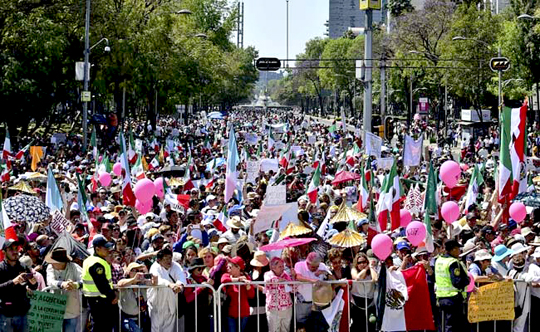Mexico City, Feb 13: Thousands of protesters in more than a dozen Mexican cities took to the streets on Sunday to express their fierce opposition to US President Donald Trump, portraying the new leader as a menace to both America and Mexico. Waving Mexicans flags and hoisting anti-Trump signs in both Spanish and English, some vulgar, many protesters also heaped scorn on their own president, deriding Enrique Pena Nieto as a weak leader who has presided over rampant corruption and violence at home.

Mr Trump and Mr Pena Nieto have been locked in battle over their countries' deep ties for months, even before Mr Trump won the presidency with promises to get tougher on immigration and trade from Mexico.
Mexico fears Mr Trump's policies could send Latin America's second biggest economy into crisis.
In a rare display of national unity, marchers and organizers came from across the country's deeply polarized political factions, encouraged in part by a pro-march ad campaign by Televisa, the country's dominant broadcaster. Local officials estimated that a total 30,000 marched in the country's two largest cities, Mexico City and Guadalajara.
In the Mexican capital, two separate marches were set to converge on the Angel of Independence monument on the city's leafy Paseo de la Reforma avenue.
"He's such a bad man and he shouldn't act the way he does," said 62-year-old marcher Jorge Ruiz about Mr Trump. Mr Ruiz was particularly angry at how the former reality TV star has insulted migrants.
One marcher carried a larger-than-life painted Trump mannequin, portraying him as an outlandish cartoon character, while others carried pinatas resembling the US leader wearing floppy Mexican hats bearing pro-Mexico slogans.
"Mexicans demand respect, we want bridges not walls," read one banner carried by nearby marchers. "Trump you diminish America," read another.
Maria Paro Cassar, an organizer, said Mr Trump has made Mexico and Mexicans in the United States "his favorite target."
"His policies are a global threat that go against pluralism and diversity and they represent a particular threat to Mexico," she added.
Three weeks into his administration, Mr Trump has vowed to move ahead with construction of his signature border wall, which he has repeatedly said Mexico will pay for, as well as signaling a new push to deport millions of unauthorized immigrants from the country.
While organizers of the marches promoted them as non-partisan, many singled out Pena Nieto as a major obstacle.
"We're also marching today to demand that our own rulers put an end to corruption and so much loss of life here and actually look out for the good of the country, not just themselves," said 28-year-old office worker Victor Robledo.
Last month, a poll showed that Mr Pena Nieto's approval ratings had hit a record low at just 12 per cent, the lowest level of support for any president in decades.
"We as Mexicans have to demand that Pena Nieto defends us and acts with dignity," said Mari Carmen Quiroz, a 51-year-old university professor. "Unfortunately, so far he's done a bad job."





Comments
Add new comment